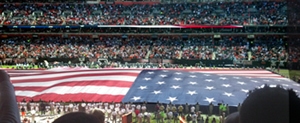Best Employment Discrimination Attorney Answer: Can my employer require a certain height or weight as a condition of employment? Is it illegal to harass people at work because of their weight or height? Do I have an employment discrimination case against my company?

Fresh off Johnny Football’s first start for the Cleveland Browns and following Cincinnati Bengals coach Marvin Lewis’ comments calling Manziel a “midget,” our employment discrimination attorneys are tackling the issue of height (and weight) discrimination in the workplace.
Before any confusion arises, it is currently legal for an employer to discriminate against someone because of their height, unless there is a disability involved, such as dwarfism. Likewise, discrimination based on being underweight or overweight is not protected, may become a disability discrimination issue if the employee is medically diagnosed as being obese or having weight issues due to a disability. Obviously, dwarfism and medically caused weight issues will create an issue under Americans with Disabilities Act (“ADA”).
Employers may also attempt to use a height restriction to weed on women from the job since men are typically taller than women. But, under Title VII of the Civil Rights Act of 1964 and Ohio Revised Code § 4112.02(A), it would be gender discrimination if an employment policy or practice that applies to everyone, regardless of gender but has a negative impact on the employment of women and is not job-related and necessary to the operation of the business. This would be what called a disparate impact claim. For example, a stock brokerage company could not put a height requirement in place at 5’8” in order to weed out women from this position because the height requirement would have nothing to do with the job.

Beyond that, this blog deals with the possibility that discrimination based just on appearance that is not based on disability or gender but may become a more prevalent issue in the U.S. and how rampant this type of discrimination is overseas.
First, in the U.S., states and the federal government has been hesitant to outlaw discrimination against employees or prospective employees based on their height and weight. In 2013, Utah attempted to pass a bill which would have prohibited discrimination based on height and weight. The bill acknowledged that employers often times judge people, whether applicants or employees, because of their height and weight. Unfortunately, the bill was voted down by a margin of 10-4.
The sponsor of the bill commented, “We start it with race, color, religion, age discrimination, those types of things. It’s a starting point. Weight and height is just a starting point that, eventually, we’ll get to that point when we have legislation that’ll address those issues.” Those who voted against the bill based their votes on the difficulty of reaching a definition of discrimination against someone because of height and weight and stated the bill would be unfair to employers. Since the Utah attempt, no state has put forth any kind of bill to make discrimination against employees because of height and weight illegal.
However, when looking at how rampant and obvious height and weight discrimination has gotten overseas, there may be a time when this issue must be revisited here in the U.S. In China, job ads regularly set forth height requirements for jobs that have no relation to an employee’s height.
For example, to study at a particular university in China, the university specifically sets forth height guidelines for men and women. To be a cleaner in Beijing, you specifically have to be a woman, which would be patently illegal in the U.S., and at least five foot three (not illegal currently in the U.S.). It has gotten so bad in China, that prospective employees list their height and weight on their résumés, much like the NFL combine does for prospect before the NFL draft.
While thankfully the practice of height and weight discrimination is not as severe, or at least as obvious, in the U.S., this is an area of employment law that can be up for increased debate. If the open practice of favoring those of a certain height or weight creeps into the U.S. labor system, there could be a flood of attempts to pass bills outlawing the practice, similar to Utah’s attempt.
Hopefully, the Cleveland Browns’ decision to overlook Johnny Manziel’s short stature (of only six feet tall) will payoff for long suffering Browns’ fans everywhere. #letswreckthisleague.
In the meantime, if you are searching “I need a lawyer because I have been wrongfully fired or terminated;” or “I have been discriminated against based on my …” race, national origin, gender, age, religion or disability; or even think that you might need an employment lawyer, then it would be best to call the right attorney to schedule a free and confidential consultation at 866-797-6040. Spitz, The Employee’s Law Firm and its attorneys are experienced and dedicated to protecting employees’ rights and solving employment disputes.
Disclaimer:
This employment law website is an advertisement. The materials available at the top of this page and at this employment law website are for informational purposes only and not for the purpose of providing legal advice. If you are still asking, “How do I …”, “What should I do …,” “My boss discriminated against me because …” or “I was fired for …”, it would be best for to contact an Ohio attorney to obtain advice with respect to any particular employment law issue or problem. Use and access to this employment law website or any of the links contained within the site do not create an attorney-client relationship. The legal opinions expressed at or through this site are the opinions of the individual lawyer and may not reflect the opinions of Spitz, The Employee’s Law Firm, Brian Spitz, or any individual attorney.
